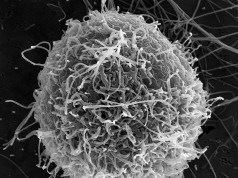Racial Disparities in Breast Cancer Treatment & Survival in Men
A great deal of research has already been devoted to survival disparities among women with breast cancer, with multiple studies showing poorer survival rates among African-American women when compared to other ethnic groups. Some of these studies suggest that unequal access to medical care may account for some of these observed differences, while other studies suggest that other factors may also be involved, including cultural biases for or against seeking early medical care, and possible differences in the biological aggressiveness of breast cancers among different ethnic groups. However, little attention has been paid to such differences in outcomes for men with breast cancer (1 percent of breast cancers occur in men). A new study from Columbia University (Journal of Clinical Oncology) analyzed a comprehensive Medicare database, and identified 510 men diagnosed with breast cancer between 1991 and 2002. The authors found that African-American men diagnosed with breast cancer were 50 percent less likely to be referred to an oncologist and subsequently receive chemotherapy when compared to Caucasian men. In terms of the risk of mortality, the black men were found to be three times more likely to die of breast cancer than the white men. Although limitations in the database used for this study make it impossible to identify the precise cause(s) for this dramatic difference in mortality due to breast cancer in men, this striking three-fold difference in mortality between African-American and Caucasian men deserves expedited prospective study in order to better understand the reasons for this survival disparity, and to identify strategies to close this huge survival gap. Unfortunately, the relatively small number of new cases of breast cancer diagnosed among men each year will require that multiple institutions collaborate on such a study in order to achieve meaningful results.
Timing of Heart Attacks & Survival (Weekend Heart Attack Victims Fare Worse)
The management of acute heart attacks has become extremely sophisticated in recent years, and often involves the use of hi-tech cardiac imaging tests and the placement of coronary artery stents by highly trained cardiologists. Unfortunately, these state of the art interventions are often not readily available during weekends and holidays at many medical centers. A recently published study from the University of
Medicine and Dentistry of New Jersey (New England Journal of Medicine) now appears to link this reduced level of cardiac care available on weekends with an adverse impact on survival. The authors analyzed a large database (Myocardial Infarction Data Acquisition System), and studied the outcomes of patients experiencing heart attacks in New Jersey between 1987 and 2002. They specifically looked at mortality rates associated with the day of admission. While no demographic differences between patients admitted on weekdays versus weekends were seen, patients admitted on weekends were significantly less likely to undergo rapid, invasive cardiac imaging and intervention when compared with patients admitted on weekdays. Although the absolute difference in 30-day mortality between the two groups of patients was small (0.9 percent), the patients admitted with a heart attack on a weekend nonetheless had a significantly lower 30-day survival than their counterparts who were admitted on a weekday. When the authors statistically eliminated invasive cardiac procedures from their analysis, this survival difference disappeared, suggesting that decreased access to invasive cardiac procedures over the weekend was the likely cause for the observed differences in mortality. At a time when many hospitals around the country are struggling to provide high-quality, state of the art medical care in the face of declining physician and hospital reimbursements for such care, it is difficult to imagine that many of these institutions will be able to afford to expend the same level of resources on weekends as they do during weekdays. The healthcare crisis in America continues to grow ever larger, with an embarrassingly large percentage of patients in the United States lacking health insurance, as well as adequate coverage among those who do have health insurance. Meanwhile, medical centers are expected to provide increasingly sophisticated and costly care to an increasingly aging population in this country, despite progressively declining reimbursement for such care by the private health insurance industry and government healthcare programs. This study points out, once again, that we continue on our longstanding collision course between the actual cost of providing high-quality, comprehensive medical care in this country, on the one hand, and the willingness of the healthcare insurance industry to adequately cover the costs of such care on the other hand.
Natural Plant Product Inhibits Growth of Prostate Cancer Cells
Prostate cancer is the most common cancer diagnosed in men. Approximately 250,000 men will be diagnosed with prostate cancer in 2007, and just under 30,000 are expected to die of the disease. Great progress has been made in detecting prostate cancers at an early stage over the past decade, and this progress in prostate cancer screening has been reflected in falling mortality rates since the introduction of the prostate specific antigen (PSA) blood test. In addition to diagnosing prostate cancer at an earlier, more curable, stage, recent improvements in treatment have reduced mortality as well. A new multi-institutional study (Cancer) brings additional potential good news to the fight against prostate cancer.Honokiol, a non-toxic, natural product derived from Magnolia tree leaves, is a popular herbal remedy in the Far East. Previous research has suggested that honokiol may have anti-cancer properties. In this study, cultured human prostate cancer cell were exposed to honokiol in the laboratory, resulting in significant cancer cell death. The authors then implanted human prostate cancer cells into the skeletons of mice, and allowed the cancer cells to grow into tumors. Honokiol was then injected into the mice, with or without a standard chemotherapy drug used to treat prostate cancer. This study revealed that honokiol alone inhibited growth of the implanted tumors, and reduced the blood levels of PSA in treated mice. The combination of honokiol and docetaxel (a chemotherapy drug often used to treat prostate cancer) appeared to be even more effective than honokiol alone in reducing tumor growth and blood PSA levels. Importantly, no toxic side effects appeared to be associated with the use of honokiol in mice. The results of this study will very likely result in a new clinical research trial that will soon allow researchers to test the effectiveness and safety of honokiol in human patients with advanced prostate cancer.
Dr. Robert Wascher is an oncologic surgeon, professor of surgery, and a widely published author. He is the Director of the Division of Surgical Oncology at Newark Beth Israel Medical Center. Send your feedback to Dr. Wascher at rwascher@doctorwascher.net





